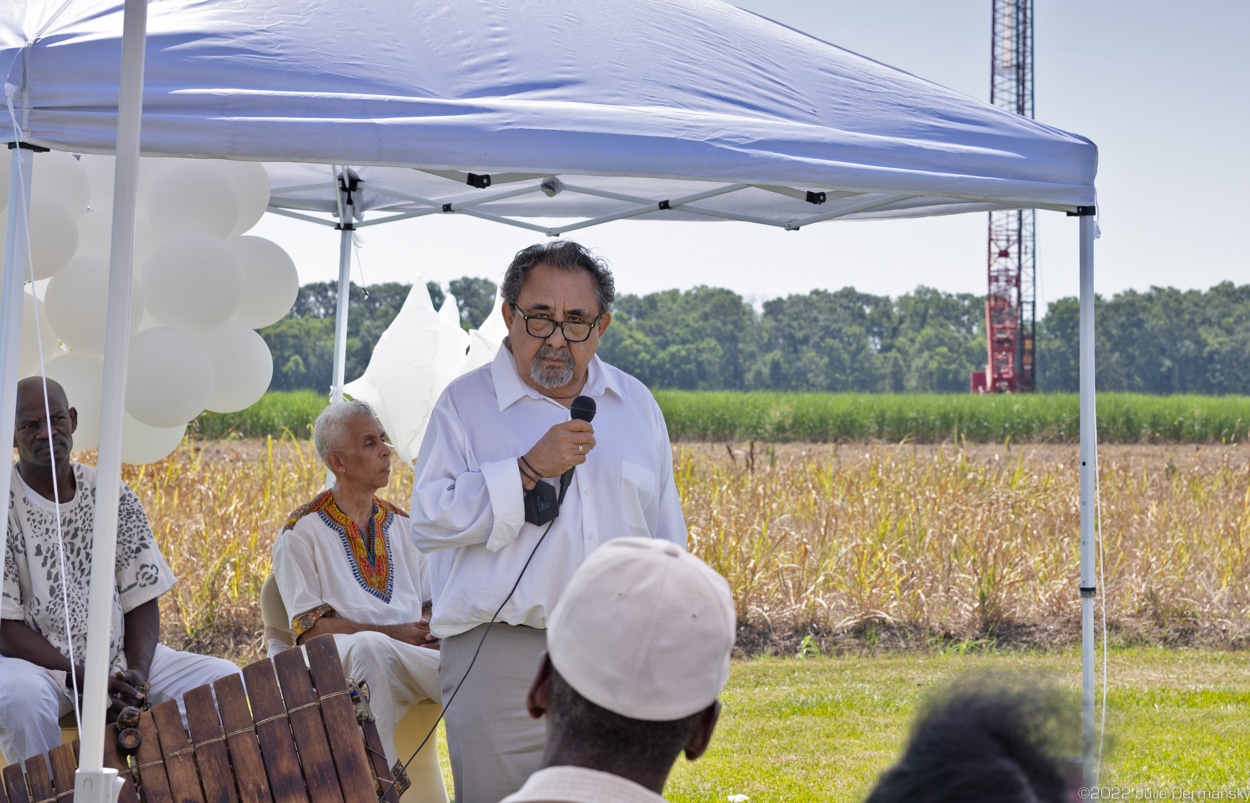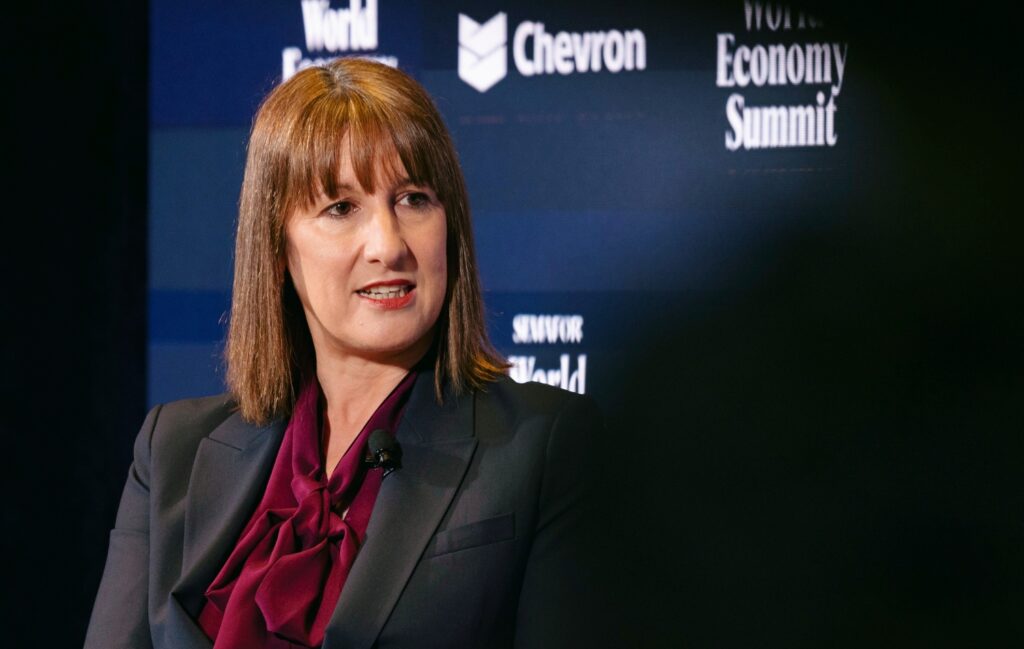Temperatures soared into the high nineties on Saturday, June 18, as Chair of the House Natural Resources Committee Rep. Raúl Grijalva spoke about the moral imperative to achieve environmental justice at a press conference on the grounds of the Whitney Plantation, a converted historical museum about slavery, in St. John the Baptist Parish, Louisiana.
After delivering an update on the bill that he spearheaded, known as the Environmental Justice For All Act, Grijalva and his team were taken on a tour of Cancer Alley where they could learn firsthand the challenging circumstances some fenceline communities face. The visit coincided with Juneteenth weekend and the start of a heat dome stretching from the Gulf Coast to Canada, serving as a reminder of the urgent need to simultaneously address the climate crisis and racial injustice.
The purpose of the environmental justice bill “is to give communities like this beautiful community and its people the dignity and the respect under the law where they are able to defend themselves and protect their families and their communities,” Grijalva said. “It’s as simple as that.”
To further inform the bill, Grijalva said they plan to hold a virtual forum to gather input from the fenceline community members they were meeting on this and other visits. The Juneteenth visit covered some of the parishes in Cancer Alley, a stretch of the Mississippi River between Baton Rouge and New Orleans lined with dozens of petrochemical plants and oil refineries.
Soon after taking office in January 2021, President Joe Biden mentioned Cancer Alley by name before signing executive actions meant to tackle climate change, create jobs, and restore scientific integrity to government agencies, a move that Grijalva praised on Saturday. But he stressed that this new legislation is needed to protect the most vulnerable communities from pollution and injustice because without it, future administrations could reverse those executive orders.
The links between racial inequity and environmental justice became glaringly obvious at the start of the pandemic. Louisiana’s Governor John Bel Edwards identified the African-American community in St. John the Baptist Parish, long burdened by air pollution, as having an alarming death rate. The same community, as well as Indigenous communities along the Gulf South, face elevated risks from pollution and intensifying extreme weather events, which scientists warn will worsen if we don’t drastically and quickly cut carbon emissions.
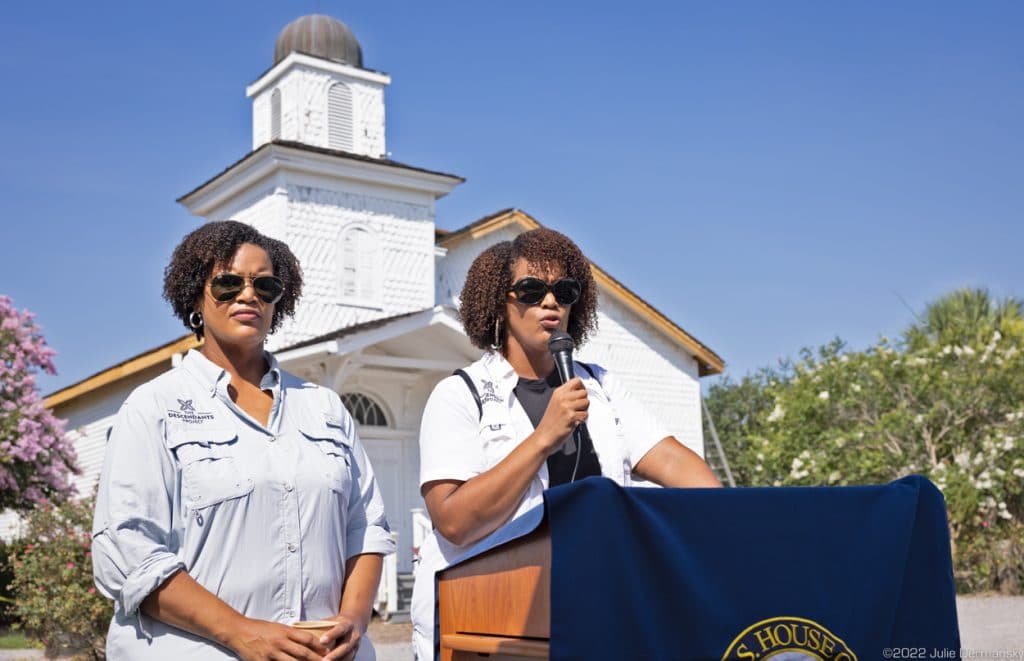
Twin sisters, Jo and Joy Banner, co-founders of the Descendants Project, a nonprofit focused on supporting the Black descendants of enslaved peoples in the region, hosted the congressional delegation over the Juneteenth weekend. They offered their support for the bill and thanked Grijalva and his team for accepting their invitation to a land blessing ceremony on Juneteenth.
The Environmental Justice for All Act is focused on protecting environmental justice communities that live next to polluting industries. A key provision of the bill mandates that federal permitting regulatory agencies consider the cumulative impacts of a proposed project under the Clean Water Act and Clean Air Act and deny permits to those projects that cannot reasonably ensure they would avoid harm to human health. In addition, the legislation would amend the Civil Rights Act of 1964 to allow individuals to sue the federal government when it takes actions that disproportionately impact the environment or health of fenceline communities. If the bill becomes law, it could remedy the kinds of injustice prevalent in Cancer Alley, where majority-Black areas, carrying a decades-long burden of industrial air pollution, continue to fight a stream of proposed industrial projects that threaten to worsen their already poor air quality.
The Descendants Project is leading the charge against agricultural company Greenfield’s proposal to build a $400 million grain terminal near the Whitney Plantation, an old sugarcane plantation, which the group and other opponents say would be detrimental to the community. The grain terminal would host 54 silos of grain like wheat and soy to be ferried onto vessels on the nearby river and would add particulate matter to the air, which already suffers from the activity of nearby chemical plants.
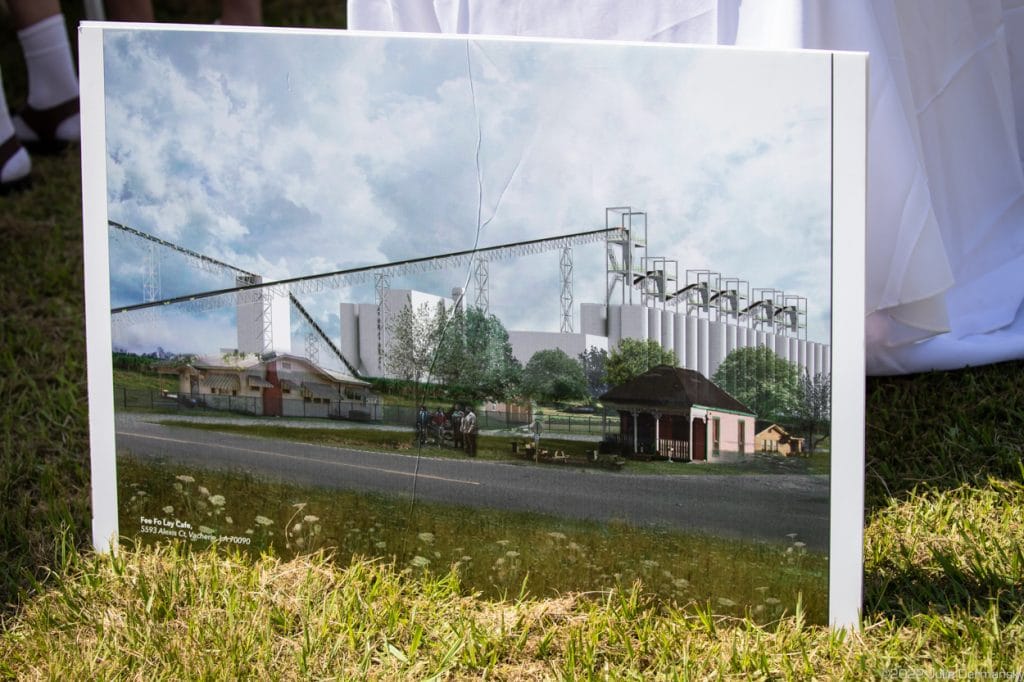
According to ProPublica, a consulting firm prepared a 2021 report meant to identify the project’s potential harms to historic sites in order for its developers to prevent or minimize them — but key findings about the grain elevator’s harms was scrubbed from the final report. The original draft concluded that the grain elevator would have “an adverse effect on historic properties,” and bring vermin, disruptive noises, and ground vibrations, and may impact as-yet undiscovered graves of enslaved people that likely are present on the former plantation grounds
Greenfield disputes its project will have negative impacts to the community and ProPublica reports that the company says “it prioritizes the protection of historic sites, and that it would halt work in any area where construction discovers unknown cultural resources.”
Another voice welcoming the congressional delegation to Cancer Alley was Ret. Lieutenant General Russel Honoré, who led the Defense Department’s Joint Task Force Katrina in 2005 and went on to found the Green Army, an environmental and social justice coalition. He thanked Grijalva for coming despite the Father’s Day and Juneteenth holiday weekend. Honoré’s work focuses on communities impacted by pollution and extreme weather — which are often one and the same, and he stressed the importance of setting up fenceline monitoring of pollutants that communities can access themselves.
He also praised the Banner sisters for trying to preserve unmarked graves and other historic sites in the region.
“The concept of heritage and descendant rolls strong in my blood, in my soul, cuz I’m a descendant of the Destrehan Plantation in St. Charles Parish,” Honoré said.
Barbara Washington, with the fenceline community group Inclusive, also voiced support for Grijalva’s ongoing environmental justice work.
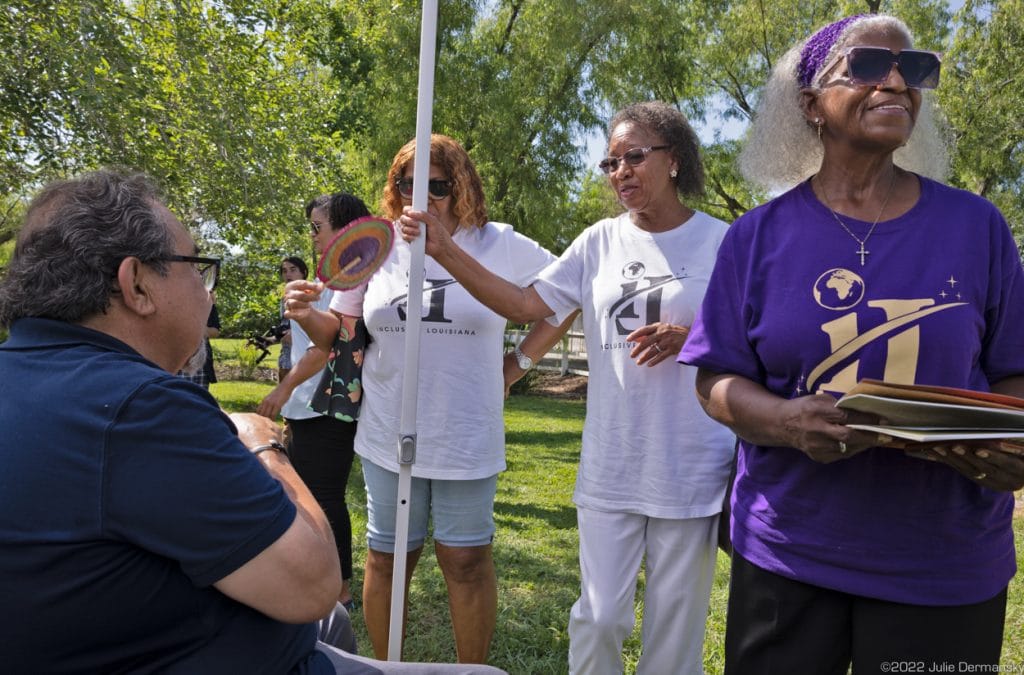
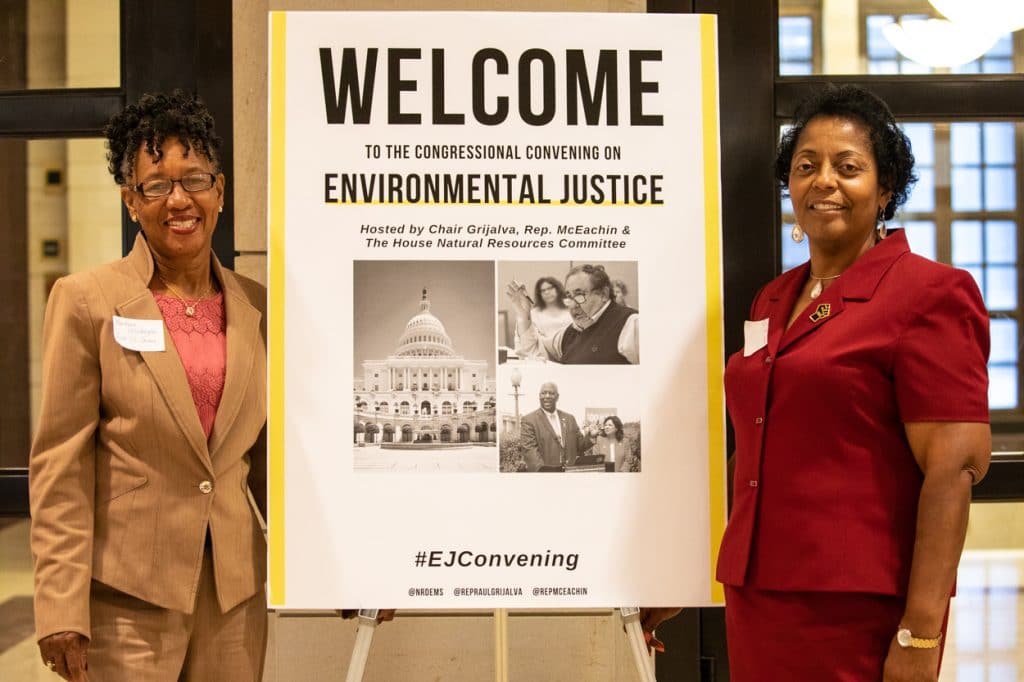
She recounted to Grijalva a trip to Washington, D.C., that she and Sharon Lavigne, another Cancer Alley community organizer, took in 2019 to attend the first-ever Congressional Convening on Environmental Justice, that he co-hosted. The full day meeting related to an earlier version of this bill which failed to move forward during the Trump administration. The current version was introduced in the House by Reps. Grijalva and Donald McEachin, along with a companion bill by Sen. Tammy Duckworth, in March 2021.
Lavigne, who spent Juneteenth weekend back in Washington, D.C., taking part in the Poor People’s Campaign march and rally, was sorry she was unable to meet with Grijalva during his visit. The 2021 Goldman Environmental Prize winner, and founder of the community group RISE St. James, plans to continue sharing input on the bill. “Hurricane Ida gave me a taste of what global warming means, law or no law,” Lavigne said later by phone. “Biden needs to do more to protect us from climate change.” She finds the President’s push to expand the LNG export capacity on the Gulf Coast worrisome. “It is moving us in the wrong direction from protecting the planet,” she said.
Lavigne lives in Welcome, a small town in St. James Parish 18 miles from the proposed area of Greenfield’s grain terminal and the site of another environmental justice battleground. Her efforts helped push the federal government to perform a full environmental review of Formosa’s $9.4 billion petrochemical complex, halting the preliminary construction that had already begun in St. James. If that plastics project is built, the nearby residents would be exposed to “more than triple” the current level of toxic chemicals, including carcinogens such as benzene, formaldehyde, and ethylene oxide, according to an analysis by ProPublica.
Some environmental advocates worry that even if Formosa doesn’t build the sprawling complex in St. James, the corporation will simply shift it elsewhere on the Gulf Coast, where the LNG export industry is expanding at a fast pace.
That expansion was raised by another fenceline community leader, Robert Taylor, the founder of the Concerned Citizens’ of St. John, who was also in D.C. taking part in the Poor People’s Campaign events alongside Lavigne.
While he appreciates Biden’s concern for fenceline communities in Cancer Alley, Taylor is also concerned by the president’s support for the buildout of the LNG export industry in the region. At a time when climate scientists tell us we have to move away from burning fossil fuels that are intensifying extreme weather events, he doesn’t understand the logic of supporting the very industry exacerbating the problem. Last August, Hurricane Ida nearly destroyed his house, which he has yet to be able to rebuild.
“You can’t separate racial justice and environmental justice,” Taylor told DeSmog. Over the weekend, Louisiana’s legislators failed to comply with a direct order from a federal judge to add an additional majority-Black congressional district to the state’s map, which currently only has one. The fact that the state legislature failed to do so is telling, Robert explained on a call. “They have totally ignored the plight of the Black people in our jurisdiction and continue to fail us miserably,” Taylor said of the state legislators.
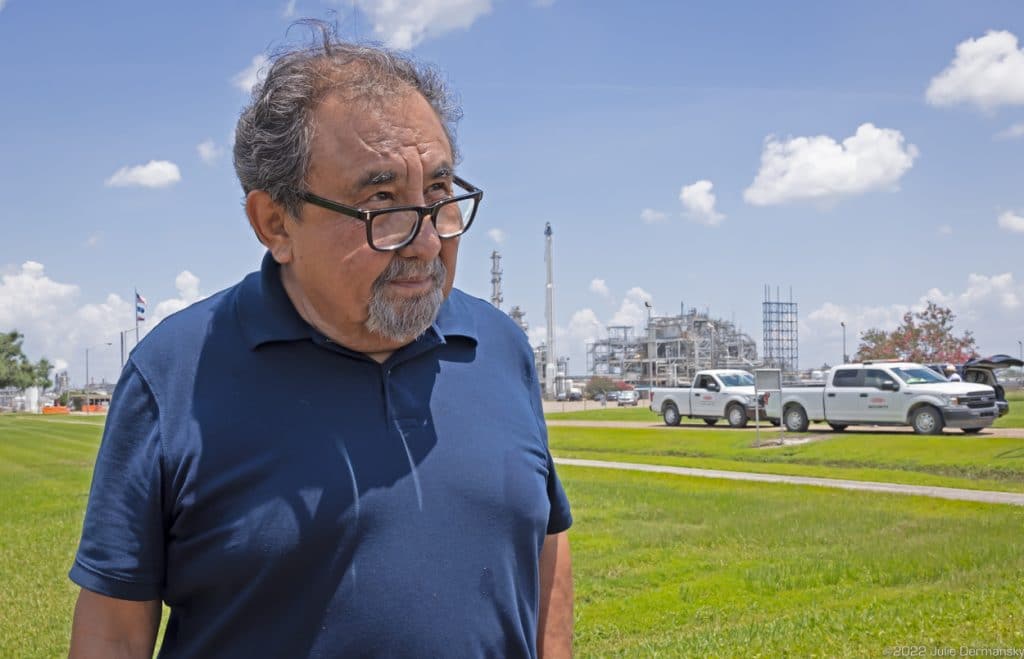
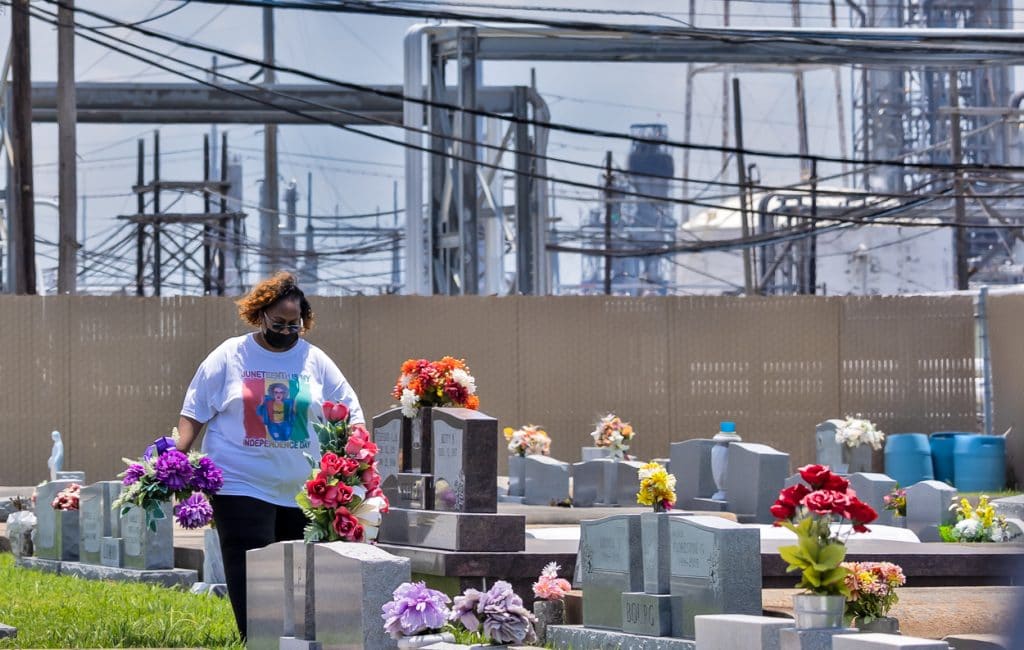
While he wasn’t able to be there, Taylor was glad that Grijalva and his team stopped by the source of decades of toxic chloroprene emissions, the Denka Performance Elastomer plant, which makes the synthetic rubber commonly called Neoprene, in St. John the Baptist Parish.
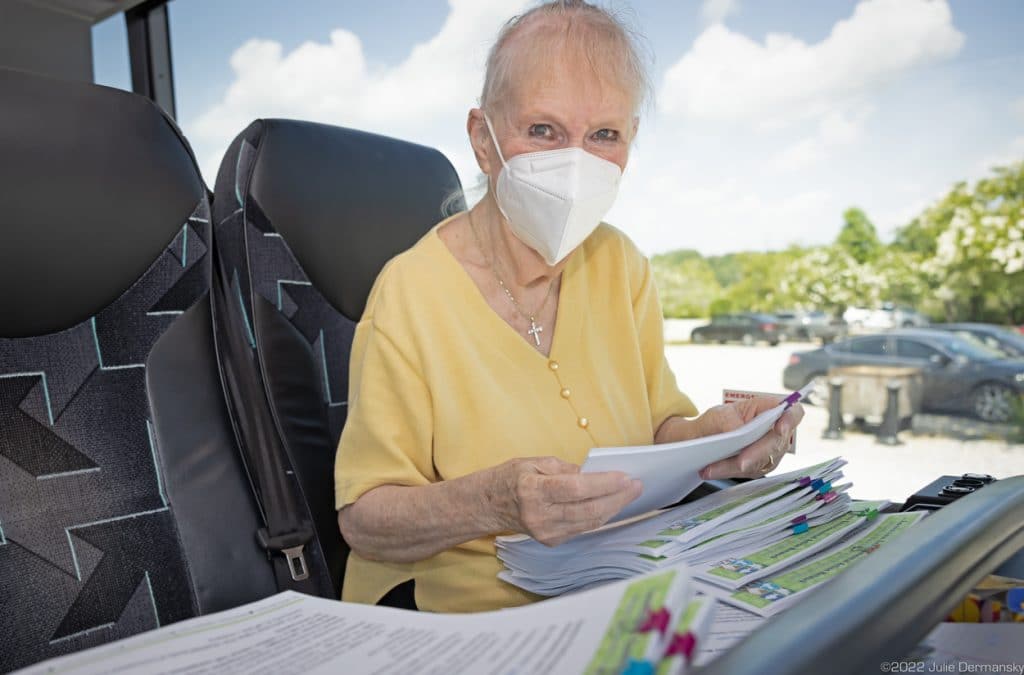
On that tour, Wilma Subra, a technical advisor to the environmental advocacy group Louisiana Environmental Action Network, briefed the delegation on the latest air monitoring readings that show chloroprene, a likely carcinogenic chemical from the Denka facility, remain higher than the EPA recommends.
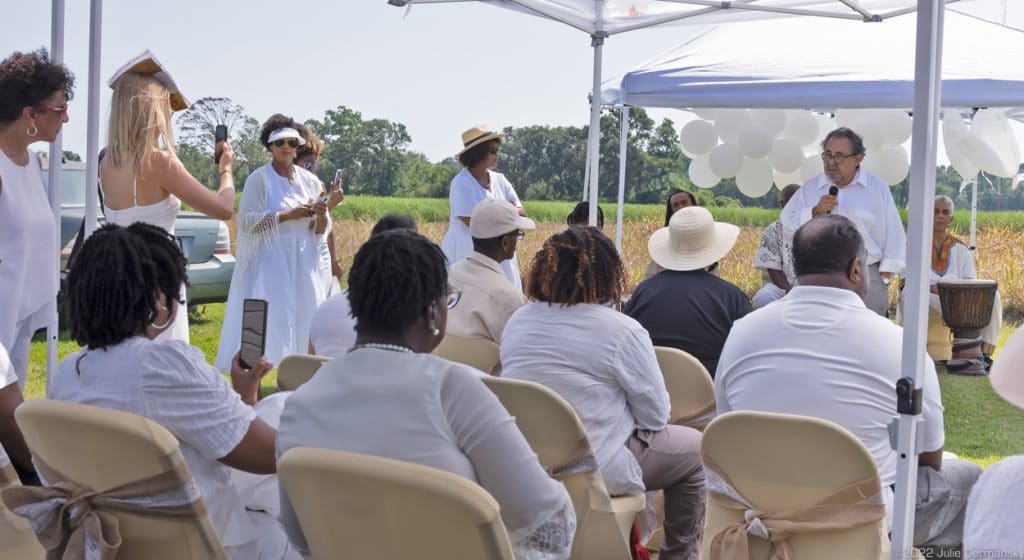
The next day, at a land blessing ceremony and Juneteenth celebration held by the Descendants Project, Grijalva explained that visiting on Juneteenth weekend was no accident. The poignancy of the date resonated with him. While history cannot be cleaned up, he said, the bill, as least, can help lead to a more just future.
“When we started this the odds were against us — nobody is going to pay attention. Well, people are paying attention,” he said about the bill’s journey. “There are 140 million people across this nation that are dealing with this issue on a day to day basis, that deal with the lack of dignity and respect and that their communities become the dumping ground for everything that nobody else wants.”
Grijalva expects the final version of the bill to be finalized soon. It will reflect further input from meetings with additional communities burdened by environmental injustice that he still hopes to visit, as well as well as feedback from the communities he has already visited.
The sweeping environmental justice legislation faces steep odds in a divided Congress, and Cancer Alley leaders like Taylor are supportive but skeptical it can pass, in part because most of his own representatives are dismissive of his community’s concerns. In his six years of fighting for clean air for St. John, he remains astounded that children, the most vulnerable to the effects of pollution, still have to attend school less than a mile from the Denka plant. “Until we can protect the children and stop them from being bombarded with toxic chemicals,” Taylor said, “my work is not done.”
Subscribe to our newsletter
Stay up to date with DeSmog news and alerts


